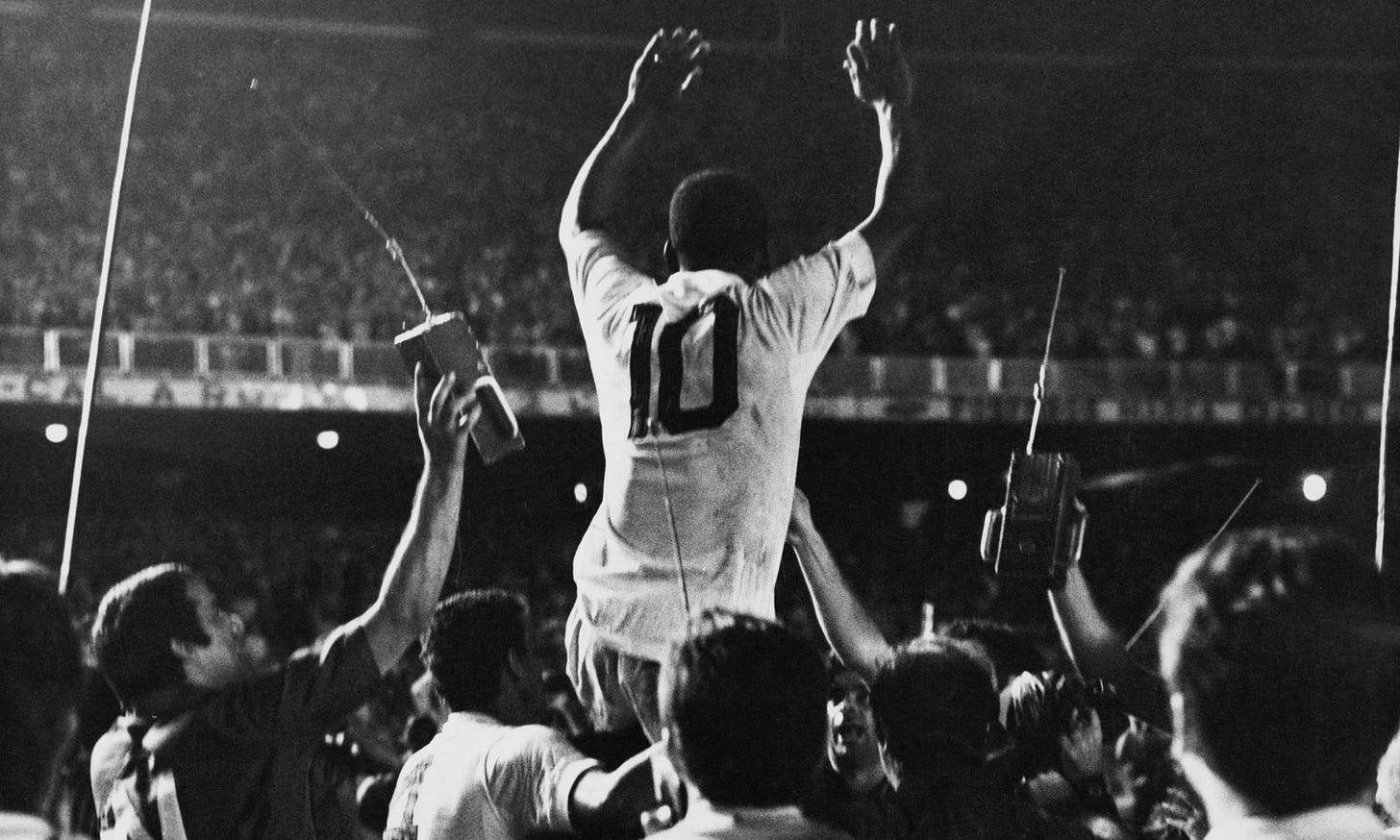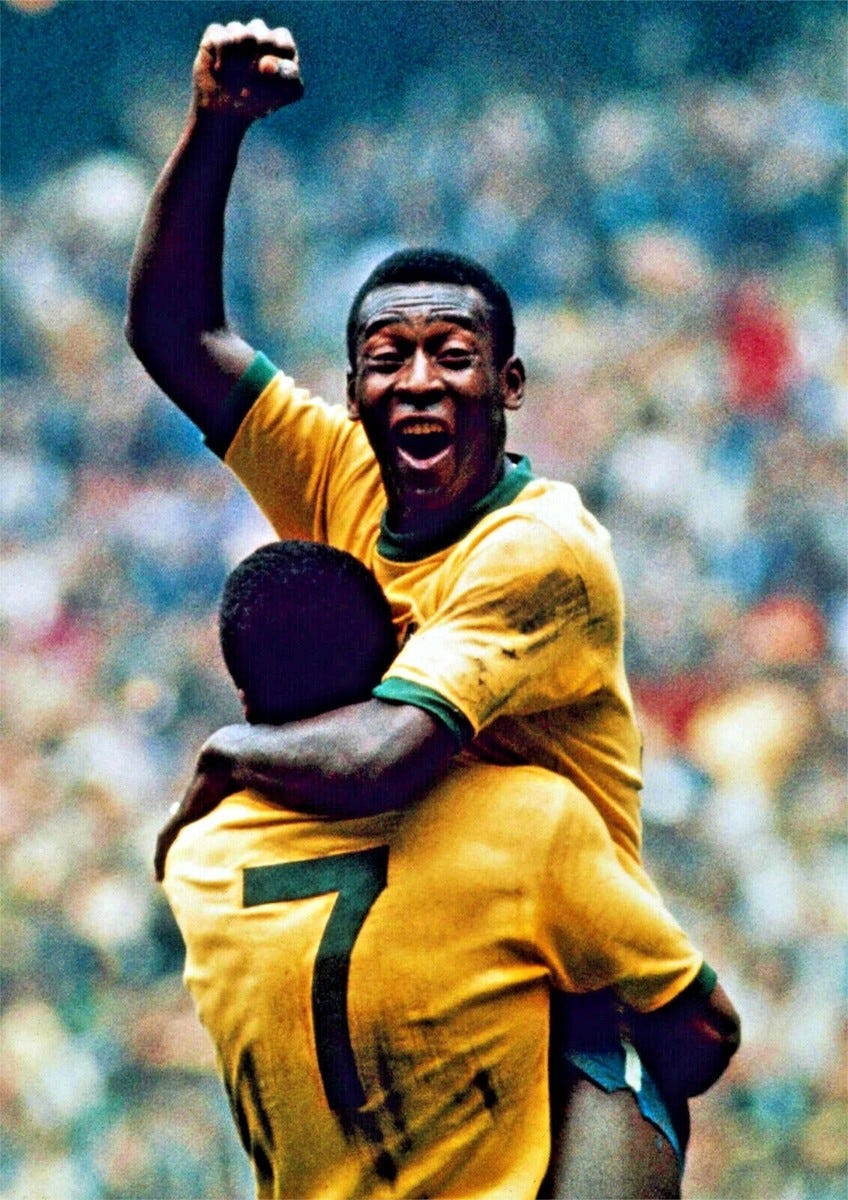On This Day in 1969, Pelé Scored His 1000th Goal and Gave Football Its Most Human Moment
Why the wet night in Rio still speaks to anyone who cares about the game
Every anniversary tempts us to lean on nostalgia, yet 19 November 1969 deserves more than a warm recollection. On this day, Pelé reached his thousandth goal, and the number alone has become a kind of shorthand for greatness. But the meaning of that night at the Maracanã lives in something deeper. It is a reminder that football’s most enduring symbols grow out of mud, rain, pain, and persistence, never clean or uncomplicated, always shaped by the country that produces them.
Pelé struck that penalty as a 29 year old who already sat at the summit of world sport. The stadium was packed, the pitch was a swamp, and the nation was waiting for an impossible moment to feel inevitable. That alone would be enough to fill an old story. Yet what makes the event worth retelling is not simply that the ball went in. It is the journey that made such a goal possible at all, and the way his response afterwards pulled the spotlight away from himself and back onto the children who reminded him of his own beginning.
To view it only as a record is to miss the point. The thousandth goal showed how a boy with a rag ball can define an era, carry a country’s affection, absorb its bruises, and still speak to the millions who grew up as he did.
Roots that Shaped the Rise
Long before the crowd roared in Rio, the story began in Bauru in the late 1940s. Pelé watched his father limp through the twilight of a modest career, and this shaped the way he saw the sport. The glamour that would be attached to his name later had no presence in the family home. Football was a trade with thin wages and a fragility anyone could feel. Injuries could take everything. A missed pay packet could unsettle a family.
Yet there was love for the game. His father taught him the fundamentals in the fading light after work, passing on the clean header, the two footed strike, the calm mind under pressure. Those evenings, played with a ball made from socks and rags, gave the boy his foundation. They also placed responsibility on him long before he reached a stadium. He was not simply learning to play. He was learning what the game cost his father and what it might give back.
By thirteen he was scoring with an assurance that felt older than his years. Santos recognised what the streets had already seen. He was small, quick, sharply balanced, and unafraid of players twice his size. Talent alone never explains careers of this scale. There is always a temperament behind it, and Pelé had that steady control instilled by a father who knew exactly what football could take from you.
Moments That Harden a Legend
By the time he arrived at the 1966 World Cup, he was already the most famous footballer alive, the player defenders studied, trapped, and kicked whenever they had the chance. The treatment he took in England marked him physically and emotionally. He left the ground in pain after yet another foul, and later vowed that he would never play in the tournament again.
This detail matters. It shows that even the most gifted are not protected from football’s darker instincts. The bruises do not spare icons. That vow, made in a dressing room clouded with defeat and frustration, revealed a man pushed close to his limit. Yet when he returned home, crowds still greeted him with affection, singing his name despite Brazil’s exit. Their warmth softened his resolve. He changed his mind. He went back to the world stage and helped win again in 1970.
Resilience is often spoken about as if it is forged in grand gestures. In truth, it grows in quieter moments, in decisions made after disappointment. Pelé’s willingness to return, even after a tournament that felt like an assault course, shaped his career as much as any trophy.
Pressure, Poetry, and One Wet Penalty
By late 1969 the country was tracking his goal tally as if it were a national stock index. Every missed chance carried a murmur of tension. Every stadium Santos visited was full, even among fans who wanted him stopped. The pursuit of the thousandth goal turned into its own story, a narrative that followed him everywhere.
Then came the night itself. A downpour turned the Maracanã into a slick hazard. Even Pelé skidded. The spectacle threatened to sink into the mud. But in the 78th minute he broke forward, was clipped from behind, and won the penalty that froze the country. Photographers leaned in. Radios perched on kitchen counters went silent. The moment asked for precision, but it also asked for calm.
He took three short strides and hesitated just long enough to wrong foot the keeper. When the ball hit the net, the stadium sent up a roar so loud it felt like a physical force. Fans surged onto the pitch. Pelé collected the ball, kissed it, and lifted it to the sky. He did not use the occasion to celebrate his own record. He dedicated the goal to poor Brazilian children, the ones who played barefoot on concrete, the ones he saw himself in.
It is easy to treat that gesture as a flourish, but it was something more. Footballers often speak of origins, but few evoke them with such clarity in a moment of triumph. In that brief statement he framed the goal not as a personal crown but as a symbol for those whose dreams are shaped in hardship. The night belonged to him, yet he handed it back to the people.
Legacy of a Single Strike
Much has been written about Pelé’s statistics, and they will continue to be weighed and argued about as long as the game is played. Numbers alone cannot explain the emotion carried by that thousandth goal. The true weight of the moment comes from the long path that preceded it. The soaked pitch, the crushed socks that once served as a ball, the father teaching his son to trust both feet, the bruises taken in World Cups, the pressure of expectation, the talent that turned into discipline, and the discipline that turned into history.
Looking back now, with the full sweep of his career visible, the scene feels almost mythical. Yet what draws me to this anniversary each year is its humanity. The world remembers the power of the strike, but I remember the boy who learned to play with scraps, the player who threatened to walk away from the game when it hurt too much, and the man who saw his milestone not as proof of superiority but as encouragement for the young.
Pelé scored 1,279 goals across 1,363 matches, and none carried more ceremony than the one he slipped past the keeper on that November night. It is tempting to let the figure overshadow the feeling, but the real legacy of the moment comes from the way he chose to speak afterwards. He understood that brilliance is only half of greatness. Perspective completes the rest.
That is why the anniversary still matters. On this day in 1969, a footballer did something extraordinary, but he also reminded the world that the extraordinary can grow out of the most ordinary circumstances. A boy with a rag ball became a symbol that children across Brazil and beyond still recognise. The thousandth goal remains a moment where sporting achievement and human truth met in perfect balance.



